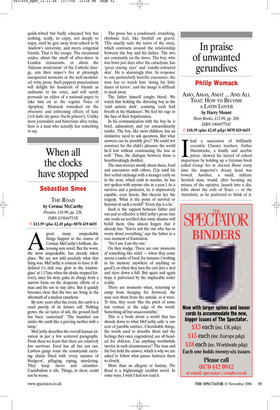When all the clocks have stopped
Sebastian Smee
THE ROAD by Cormac McCarthy Picador, £16.99, pp. 226, ISBN 033044753X ✆ £13.59 (plus £2.45 p&p) 0870 429 6655 Agreat many unspeakable things happen in the course of Cormac McCarthy’s brilliant, distressing new novel. But the worst, the most unspeakable, has already taken place. We are not told precisely what that thing was. McCarthy is content to leave it illdefined (‘a dull rose glow in the windowglass’ at 1.17am, when the clocks stopped forever), since his story gains its charge from a narrow focus on the desperate efforts of a man and his son to stay alive. But it quickly becomes clear that the two are living in the aftermath of a nuclear cataclysm.
By now, years after the event, the earth is a cruel parody of its former self. Nothing grows, the air tastes of ash, the ground itself has been ‘cauterised’. ‘The banished sun circles the earth like a grieving mother with a lamp.’ McCarthy describes the overall human situation in just a few scattered paragraphs. From these we learn that there are relatively few survivors. Food has all but run out. Lawless gangs roam the countryside carrying chains fitted with ‘every manner of bludgeon’, pillaging, raping, murdering. They keep slaves and catamites. Cannibalism is rife. Things, in short, could not be worse. The prose has a condensed, crunching, rhythmic feel, like footfall on gravel. This exactly suits the tenor of the story, which contracts around the relationship between the boy and his father. The two are constantly on the move. The boy, who was born just days after the cataclysm, has ‘great staring eyes’ and ‘candle-coloured skin’. He is alarmingly thin. In response to one particularly horrific encounter, the man has to watch him ‘doing his little dance of terror’, and the image is difficult to push away.
The father himself coughs blood. We watch him holding the shivering boy in the ‘cold autistic dark’, counting ‘each frail breath in the blackness’. We feel his rage in the face of their hopelessness.
In his communication with the boy he is brief, admonitory and yet extraordinarily tender. The boy, like most children, has an instinctive need to ask questions. But what answers can he possibly give? ‘He could not construct for the child’s pleasure the world he’d lost without constructing the loss as well.’ Thus, the dialogue between them is heartbreakingly distilled.
The man worries mostly about shoes, food and encounters with others. (Up until his first verbal exchange with a stranger early on in the story, which ends in murder, he has not spoken with anyone else in a year.) As a survivor and a protector, he is impressively capable, even heroic. But therein lies the tragedy. What is the point of survival or heroism in such a world? ‘Every day is a lie.’ Such is the rapport between father and son and so effective is McCarthy’s prose that one reads on terrified that some disaster will befall them. One almost forgets that it already has. ‘You’re not the one who has to worry about everything,’ says the father in a rare moment of frustration.
‘Yes I am. I am the one.’ On they trudge. There are rare moments of something like relief — when they come across a cache of food, for instance (‘nothing in his memory anywhere of anything so good’), or when they turn the cart into a sled and steer down a hill. But again and again hope is pulverised by the implacable wider reality.
There are moments when, returning to camp from foraging for firewood, the man sees them from the outside, as it were. To him, they seem ‘like the pitch of some last venture at the edge of the world. Something all but unaccountable.’ This is a book about a world that has shrunk down to what McCarthy calls ‘a raw core of parsible entities’. Cherishable things, the words used to describe them and the feelings they once engendered, are all headed for oblivion. Can anything worthwhile survive in such circumstances? The man and the boy hold the answer, which is why we are asked to follow what passes between them so closely.
More than an allegory or fantasy, The Road is a frighteningly credible novel. In some ways, I wish I had not read it.


































































































 Previous page
Previous page